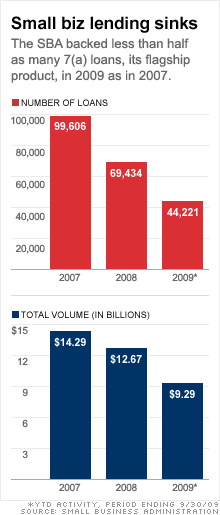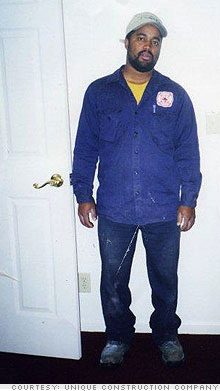Small business credit cards flourish as loans disappear
As traditional loans dry up, banks are funneling more of their small business lending through credit cards.

 |
| Unable to get a business loan, construction company owner Charles Brooks maxed out 11 credit cards to keep his business running. |
NEW YORK (CNNMoney.com) -- Want a loan for your business? Hit the plastic. That's about all banks are going to offer -- and the terms are much less favorable than traditional lines of credit.
In one notable example, JPMorgan Chase (JPM, Fortune 500) last month unveiled its Ink suite of four new small business credit cards, with interest rates as high as 30%. Meanwhile, the bank has slashed other small business lending. Its lending through the Small Business Administration's primary loan program fell 80% this year, from 6,100 loans in 2008 to 1,250 loans in the SBA's 2009 fiscal year, which ended Sept. 30.
Unlike credit cards, which carry variable interest rates and credit limits that can be cut or changed at the bank's whim, SBA loans offer a fixed amount of money at an interest rate capped by the government. They're safer than credit cards, but these kinds of traditional loans have dried up throughout the recession.
What credit remains is coming most often from credit cards. Almost 60% of small business owners have used a credit card in the past year for business capital, according to a recent survey by the National Small Business Association (NSBA), an industry trade group. In contrast, 45% of those polled had a bank loan.
"Today's entrepreneurs are severely limited in their ability to finance new business ventures by leveraging the value of their home, borrowing from friends and family, or securing a traditional loan," NSBA Chair Keith Ashmus wrote in an accompanying report. "This leaves one clear, often unattractive option: credit cards."
Credit cards have always played a big role in helping entrepreneurs get new ventures off the ground. What's changing, analysts say, is that other options are disappearing.
The number of small business loans for $100,000 to $1 million fell 23% in 2008, according to an SBA analysis released in May. But the number of loans under $100,000 rose 16%. Charles Ou, the report's author, attributes most of that increase to an increase in credit card accounts.
Pinning down the details of the shift is challenging. "The data is not that precise," said Ou, who recently retired from his post as a senior economist with the SBA's Office of Advocacy. "That is the biggest problem."
In the various reports they send regulators, banks aren't required to separate credit cards from other loans they make to small businesses. Consequently, analysts are left guessing about what percentage of small business lending goes through cards.
JPMorgan's Ink launch comes as the industry's overall small business lending is dropping. Since April, when the Treasury Department began requiring big banks that received government aid to file monthly reports on their small business lending, the 22 reporting banks have cut their lending by $8 billion.
Chase's own small business loan balance has steadily declined, falling a bit further each month. By August, the bank's balance -- which includes both traditional loans and credit cards -- stood at $25.7 billion, down 1.7% from April.
JPMorgan chalked the drop up to the weak economy. "We have seen a weakness in demand, which is natural since during a recession businesses tend to save their cash or use it to pay off debts," spokeswoman Christine Holevas said. "While we tightened credit standards, we also continue to lend."
Enter Ink. "This is something that we are pursuing because we think it is a significant opportunity," said Richard Quigley, president of Chase Business Cards. "We think small business owners are really the ones that are going to turn around the economy." Chase declined to comment on how many Ink cards it plans to issue.
Chase's aggressive credit-card push is hitting just as its rivals in the space are dropping away. Advanta, which dealt exclusively in small business credit cards, shut down its lending in May. And American Express (AXP, Fortune 500), long a major player, is trying to shore up its balance sheet by cutting credit lines and reducing its lending. Between April and August, Amex cut its outstanding small business loan balance by almost $1 billion.
Chase has clearly taken note. One of its new cards, Ink Bold, is the first pay-in-full change card the bank has ever offered -- a direct challenge to a market American Express traditionally dominated.
Analysts say it's a smart move. With small business owners desperate for credit and rivals pulling back, Chase has the opportunity pick off the most attractive borrowers. "They can get the crème of the crop," said Adam Jusko, founder of industry news Web site IndexCreditCards.com. "There has almost been a moratorium in the landscape as far as small businesses are concerned, and you have to figure there are some good, good credit customers out there."
Chase isn't the only one eying that pent-up demand. Barclays and Citibank (C, Fortune 500) have noticeably stepped up their direct-mail marketing for small business cards in recent months, and Bank of America (BAC, Fortune 500) had held steady with a blizzard of mailings, according to Mintel Comperemedia, a market research firm.
Small business owners unable to obtain traditional loans say they have little choice other than to use credit cards. Charles Brooks, the owner of a 29-year old construction company in Detroit, has maxed out 11 of them to keep his business running.
"We are hanging on by a hope and a prayer," Brooks said. "We are trying to stay alive in the business."
Brooks' company, Unique Construction, specializes in home improvement. But Detroit has been slammed by plunging home values and one of the highest unemployment rates in the nation. Few in the area are spending money right now on upgrading their homes. "It is really, really, really slow in Detroit. I have never seen it this bad," Brooks said. His one-time staff of four has dropped to a team of subcontractors that only get paid when there's work.
Brooks applied for two business loans with Chase, first in 2007 and then again in 2008. Both applications were denied. While he had always had credit cards, Brooks never had to depend on them before: "We just never really used them -- they were just there." But toward the end of 2008, Brooks started paying bills and suppliers with his cards.
Now, he's hit the limits on nearly a dozen cards. Brooks isn't sure where to turn to next to keep his business running.
"We are praying," he said. "We are praying for a better Detroit, a better world." ![]()
-
The Cheesecake Factory created smaller portions to survive the downturn. Play
-
A breeder of award-winning marijuana seeds is following the money and heading to the U.S. More
-
Most small businesses die within five years, but Amish businesses have a survival rate north of 90%. More
-
The 10 most popular franchise brands over the past decade -- and their failure rates. More
-
These firms are the last left in America making iconic products now in their twilight. More








